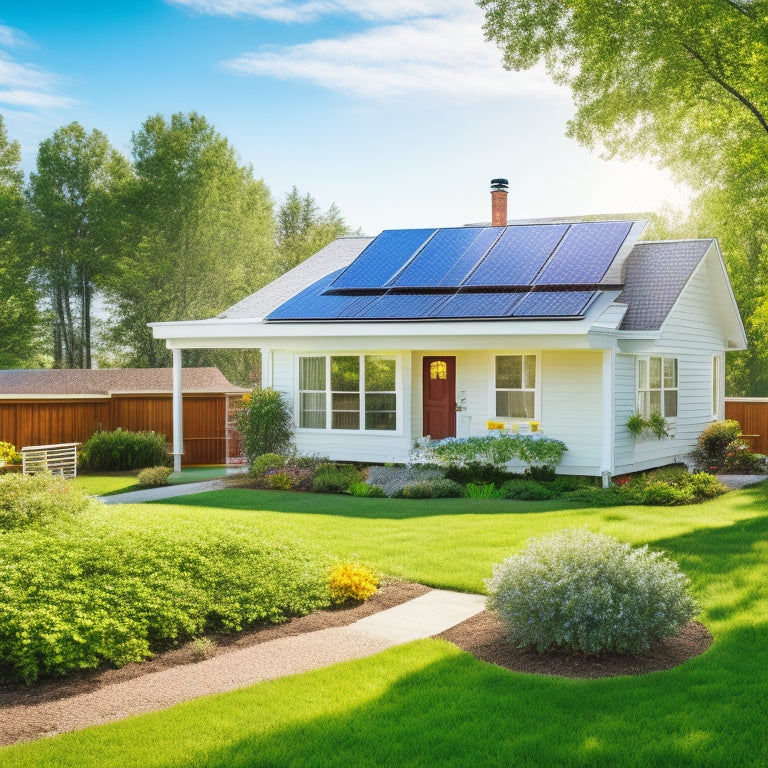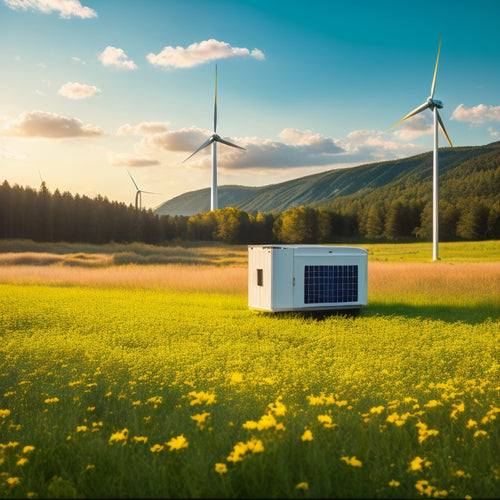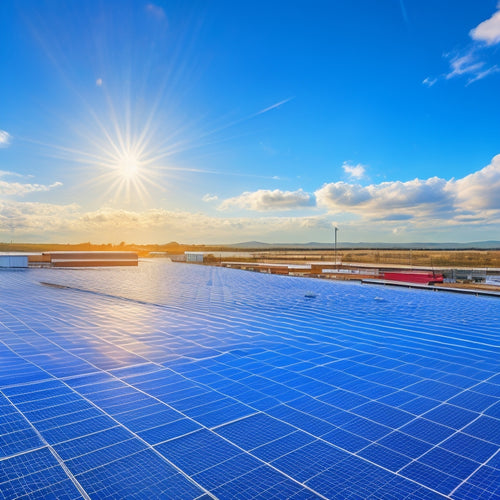
Why Small Homes Need Renewable Energy Systems
Share
You're taking a significant step towards minimizing your environmental footprint and maximizing your energy independence by considering renewable energy systems for your small home. Renewable energy integration reduces your carbon footprint, increases energy efficiency, and enhances your property value. With approximately 90% of small homes capable of accommodating solar panel systems, you can shift to off-grid living, reducing dependence on the grid and utility companies. By investing in renewable energy systems, you'll not only reduce your energy consumption costs but also contribute to a more sustainable future. Now, investigate the specific benefits and opportunities that await your small home.
Overview
- Small homes can reduce their carbon footprint and energy consumption by integrating renewable energy systems, promoting a sustainable future.
- Renewable energy systems increase energy independence, reducing reliance on the grid and vulnerability to utility companies and price fluctuations.
- Transitioning to renewable energy systems can significantly lower energy costs, providing substantial financial savings for small homeowners.
- Incorporating renewable energy systems can elevate property value, making small homes more attractive investments and supporting climate action.
- Renewable energy systems, such as solar panels, can be effectively installed in small homes, with approximately 90% of homes accommodating solar panel systems.
Benefits of Renewable Energy
By integrating renewable energy systems into your small home, you can reap numerous benefits that extend beyond just reducing your carbon footprint.
You'll increase energy efficiency, reducing your reliance on the grid and saving on energy costs. Sustainable living becomes a tangible reality, as you utilize natural resources like wind, water, or geothermal energy to power your daily life.
This shift also enhances your energy independence, freeing you from the constraints of traditional power sources. By embracing independence through solar power systems Energy Independence and Autonomy, you can reduce your vulnerability to utility companies and nurture community pride and ownership.
Additionally, renewable energy systems can elevate your property value, making your small home a more attractive and sustainable investment.
Solar Panel Systems for Small Homes
About 90% of small homes can accommodate solar panel systems, making them an attractive option for homeowners seeking to employ renewable energy.
You'll want to take into account solar panel efficiency, which has improved greatly over the years, allowing you to generate more power with fewer panels. High-efficiency panels are vital for reliable renewable energy, especially in remote areas where off-grid solar systems are essential.
When it comes to installation, you'll need to assess your roof's size, orientation, and shading to determine the ideal system size and layout. Financing options, such as power purchase agreements and solar loans, can help make solar more affordable.
To maintain your system, you'll need to clean the panels regularly and perform occasional inspections.
Finally, energy storage solutions, like batteries, can provide backup power during outages and optimize your energy usage.
Reducing Energy Dependence
As you shift to renewable energy systems, reducing energy dependence becomes a crucial aspect of achieving a more sustainable lifestyle. By utilizing power from natural sources, you'll decrease your reliance on the grid and move closer to energy autonomy.
This means you'll be less affected by price fluctuations, outages, and infrastructure failures. With grid independence, you'll have more control over your energy consumption and production, allowing you to make informed decisions about your energy usage.
By reducing your energy dependence, you'll not only lower your carbon footprint but also enjoy increased freedom and peace of mind, knowing you're generating your own clean energy.
In addition, off-grid solar systems facilitate community strengthening and provide energy independence, which is essential for socioeconomic development. They also contribute to climate action through reduced reliance on fossil fuels, supporting global efforts towards a more sustainable future.
Environmental Impact of Small Homes
Small home dwellers' carbon footprint is a major concern, given the staggering 28% of global greenhouse gas emissions attributed to residential energy consumption.
You, as a small home dweller, play an essential role in mitigating climate change. The materials used in your home's construction and operation contribute to your environmental impact. Using sustainable materials, such as reclaimed wood, low-VOC paints, and recycled insulation, can reduce your ecological footprint.
Furthermore, energy efficiency is key to minimizing your carbon footprint. By incorporating energy-efficient appliances, insulation, and windows, you can greatly lower your energy consumption.
Additionally, transitioning to off-grid living and utilizing renewable energy sources, such as solar power, can drastically reduce your carbon footprint and contribute to energy independence.
Cost Savings for Homeowners
You've taken considerable steps towards reducing your environmental impact by incorporating sustainable materials and energy-efficient features into your small home.
Now, it's time to reap the financial rewards. By investing in renewable energy systems, you'll enjoy substantial cost savings through increased energy efficiency. You'll reduce your reliance on the grid, lowering your utility bills and saving money on energy consumption.
Additionally, you'll benefit from financial incentives, such as tax credits and rebates, offered by governments and utilities for adopting renewable energy solutions. These incentives can considerably offset the upfront costs of installation, making renewable energy systems a smart investment for your small home.
Frequently Asked Questions
Can I Install Renewable Energy Systems Myself Without Professional Help?
You can attempt a DIY installation, but consider the cost considerations: without knowledge, you might void warranties, compromise system efficiency, and sacrifice safety, ultimately offsetting any initial savings, so weigh the risks before deciding to go solo.
How Do Renewable Energy Systems Affect My Home's Resale Value?
Ironically, you're worried about resale value, but renewable energy systems will actually increase it, thanks to the allure of energy efficiency, making your home a hot commodity in a market where freedom from fossil fuels is coveted.
Are Renewable Energy Systems Noisy or Obtrusive in Small Homes?
You'll find that modern renewable energy systems are designed to minimize noise levels, ensuring a peaceful living space. Aesthetic considerations are also prioritized, with sleek designs that blend seamlessly into your small home's structure, preserving your freedom to live life on your own terms.
Can I Use Renewable Energy Systems With My Existing Electrical Grid?
As you steer through the energy terrain, imagine your home as a ship sailing towards independence. You can utilize the wind and sun to chart your course, and yes, you can dock safely with the existing grid, ensuring grid compatibility and energy independence, without sacrificing freedom or convenience.
Do Renewable Energy Systems Require Frequent Maintenance or Repairs?
You'll find that renewable energy systems, like solar and wind power, require minimal maintenance, extending their system longevity; with regular checks, you'll keep maintenance costs low, ensuring your energy independence and freedom from grid reliance.
Ready to Buy
As you invest in a small home, you're not only reducing your carbon footprint but also securing a sustainable future. By integrating renewable energy systems, you'll reap benefits like reduced energy dependence, lower energy bills, and a minimized environmental impact. Furthermore, you'll be contributing to a cleaner, healthier planet. With solar panel systems, you'll capture free energy from the sun, slashing your reliance on fossil fuels. By going green, you'll be doing your part to create a better tomorrow, today.
Related Posts
-

Sustainable and Eco-Friendly Generators for a Reduced Carbon Footprint
Sustainable and eco-friendly generators are perfect for cutting your carbon footprint and increasing energy efficienc...
-

Solar Powered Lights for Sustainable Home Decor
Solar-powered lights offer a stylish and eco-friendly way to enhance your home decor. They capture sunlight, converti...
-

Commercial Solar Energy
As you consider powering your business with commercial solar energy, you'll uncover it offers a triple benefit: signi...


